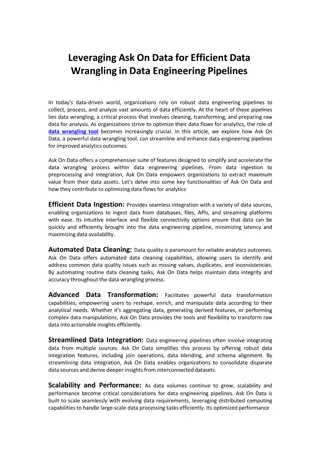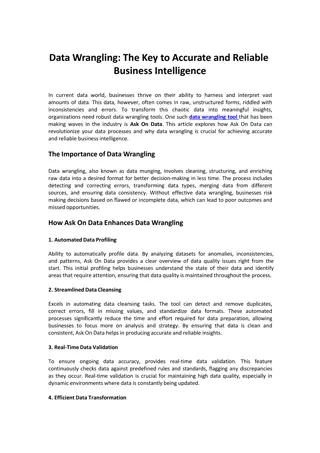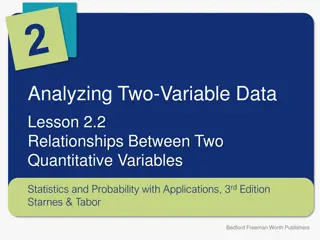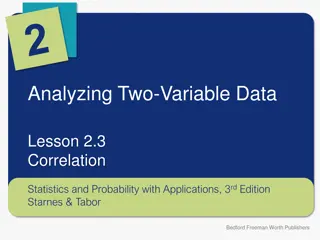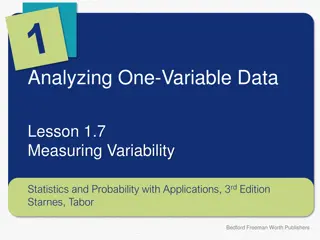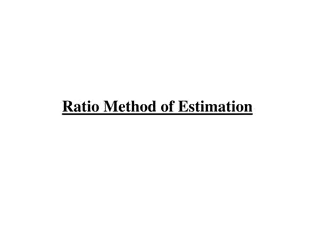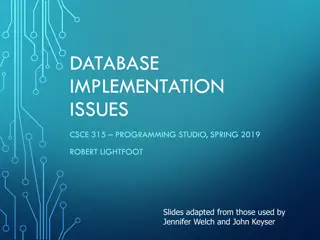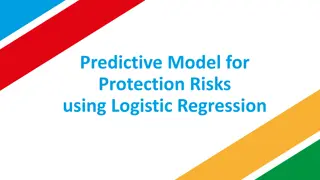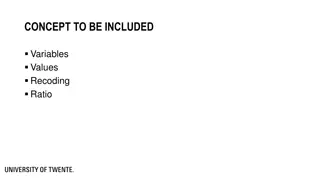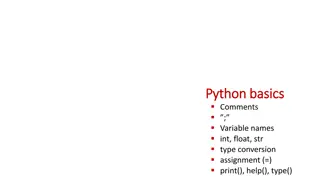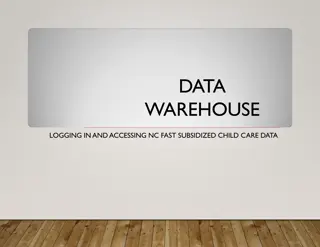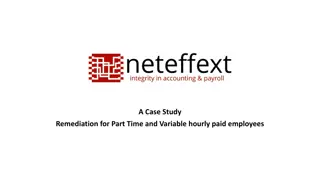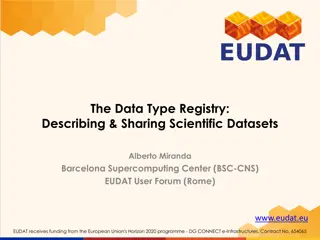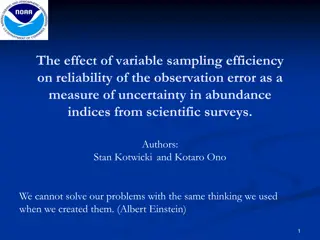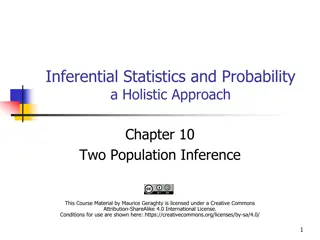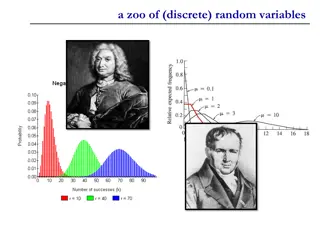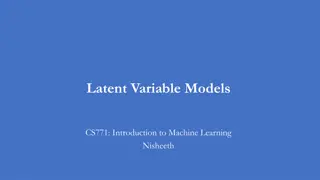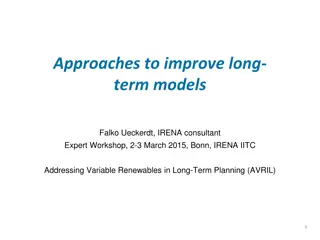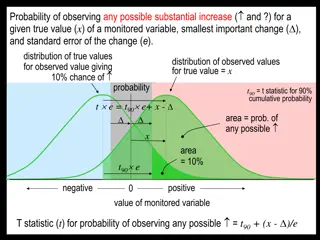Network Simulation Course on Variable Length Subnet Masks (VLSM) at Al-Mustaqbal University
This course, conducted by Dr. Muamer N. Mohammed at Al-Mustaqbal University's College of Engineering and Technology, focuses on Variable Length Subnet Masks (VLSM). The lectures cover VLSM techniques, subnetting with and without VLSM, application of VLSM, examples of VLSM implementation, and practic
2 views • 11 slides
Challenges and Opportunities in Harmonizing School Principals' Salaries
The retribution structure of school principals involves various components such as fixed salary, variable positions, and performance-based pay. The allocation of these components, particularly the variable portion, poses challenges due to discrepancies among regions. Despite recent increases, there
2 views • 16 slides
NCI Data Collections BARPA & BARRA2 Overview
NCI Data Collections BARPA & BARRA2 serve as critical enablers of big data science and analytics in Australia, offering a vast research collection of climate, weather, earth systems, environmental, satellite, and geophysics data. These collections include around 8PB of regional climate simulations a
8 views • 22 slides
Ask On Data for Efficient Data Wrangling in Data Engineering
In today's data-driven world, organizations rely on robust data engineering pipelines to collect, process, and analyze vast amounts of data efficiently. At the heart of these pipelines lies data wrangling, a critical process that involves cleaning, transforming, and preparing raw data for analysis.
2 views • 2 slides
Data Wrangling like Ask On Data Provides Accurate and Reliable Business Intelligence
In current data world, businesses thrive on their ability to harness and interpret vast amounts of data. This data, however, often comes in raw, unstructured forms, riddled with inconsistencies and errors. To transform this chaotic data into meaningful insights, organizations need robust data wrangl
0 views • 2 slides
The Concept of Return to Factor in Production Economics
Return to Factor is a key concept in production economics that explains the relationship between variable inputs like labor and total production output. The concept is based on the three stages of production - increasing returns, diminishing returns, and negative returns. By analyzing the behavior o
0 views • 7 slides
Analyzing Two-Variable Data in Statistics and Probability
This content delves into analyzing relationships between two quantitative variables in statistics and probability, focusing on distinguishing between explanatory and response variables, creating scatterplots, and interpreting the strength and form of relationships displayed. It emphasizes the import
0 views • 14 slides
Comparing Logit and Probit Coefficients between Models
Richard Williams, with assistance from Cheng Wang, discusses the comparison of logit and probit coefficients in regression models. The essence of estimating models with continuous independent variables is explored, emphasizing the impact of adding explanatory variables on explained and residual vari
1 views • 43 slides
Computation of Machine Hour Rate: Understanding MHR and Overhead Rates
Computation of Machine Hour Rate (MHR) involves determining the overhead cost of running a machine for one hour. The process includes dividing overheads into fixed and variable categories, calculating fixed overhead hourly rates, computing variable overhead rates, and summing up both for the final M
5 views • 18 slides
Multiple Baseline Designs in Behavioral Experiments
Multiple Baseline Designs are a type of experimental design used in behavioral research. This design involves measuring two or more behaviors concurrently in a baseline condition, applying a treatment variable to one behavior at a time while maintaining baseline conditions for others, and then seque
0 views • 34 slides
Correlation in Two-Variable Data Analysis
Exploring the concept of correlation in analyzing two-variable data, this lesson delves into estimating the correlation between quantitative variables, interpreting the correlation, and distinguishing between correlation and causation. Through scatterplots and examples, the strength and direction of
0 views • 13 slides
Data Governance and Data Analytics in Information Management
Data Governance and Data Analytics play crucial roles in transforming data into knowledge and insights for generating positive impacts on various operational systems. They help bring together disparate datasets to glean valuable insights and wisdom to drive informed decision-making. Managing data ma
1 views • 8 slides
Variability in One-Variable Data Analysis
Exploring the concept of variability in statistical analysis of one-variable data, focusing on key measures such as range, interquartile range, and standard deviation. Learn how to interpret and calculate these metrics to understand the spread of data points and identify outliers. Utilize quartiles
2 views • 19 slides
Introduction to Lists and Dictionaries in Python
This lecture discusses Lists and Dictionaries in Python programming. It covers the differences between these two data structures, their usage, variable storage, and handling larger data sets. The session introduces Lists as containers for related data pieces and explains how to create, access, and m
3 views • 36 slides
Marginal Costing in Cost Accounting
Marginal Costing is a cost analysis technique that helps management control costs and make informed decisions. It involves dividing total costs into fixed and variable components, with fixed costs remaining constant and variable costs changing per unit of output. In Marginal Costing, only variable c
1 views • 7 slides
Ratio Method of Estimation in Statistics
The Ratio Method of Estimation in statistics involves using supplementary information related to the variable under study to improve the efficiency of estimators. This method uses a benchmark variable or auxiliary variable to create ratio estimators, which can provide more precise estimates of popul
1 views • 30 slides
Database Implementation Issues in Programming Studio
Key topics covered in the slides include database implementation issues, storing data efficiently, and strategies for handling variable length fields in tuple storage. The presentation delves into specialized algorithms for database efficiency and reliability, terminology related to database impleme
0 views • 32 slides
2020 Company Confidential - Add-Ons and Variable Properties Guidelines
This document provides guidelines for add-ons and variable properties within the context of the 2020 Company Confidential data. It covers various aspects such as variable validations, logic return types, export/import considerations, and the handling of accessory items. The content emphasizes the pr
0 views • 39 slides
Study on the Relationship Between Release Distance and Bounce Distance of Golf Ball
Experiment investigating how the release distance affects the bounce distance of a golf ball from bounce one to bounce two. The hypothesis suggests that a greater release distance will result in the ball traveling farther. Controlled variables include the angle of the ramp, ball, height, and surface
0 views • 13 slides
Data Collection and Analysis for Businesses
Explore the impact and role of data utilization in organizations through the investigation of data collection methods, data quality, decision-making processes, reliability of collection methods, factors affecting data quality, and privacy considerations. Two scenarios are presented: data collection
1 views • 24 slides
Predictive Model for Protection Risks Using Logistic Regression
Utilizing logistic regression, a statistical modeling technique, to predict protection risks on freedom of movement in Afghanistan. The analysis involves exploratory data examination, correlation matrices, and predictor variable assessment to identify factors influencing the outcome variable. Insigh
2 views • 20 slides
Variable Recoding and Transformation in SPSS
Learn how to change variable types, recode values, and transform data in SPSS to enhance analysis accuracy and efficiency. Discover techniques for handling various levels of measurement, creating new variables, and managing value labels effectively.
0 views • 15 slides
Load Following by Nuclear Power Plants in Relation to Variable Renewable Energies' Development
The study explores the requirements of load following by nuclear power plants in the context of variable renewable energies' growth. It discusses the impact of renewable energy development on nuclear economic models and the need for dispatchable capacities. Benchmarks are set to test robustness of d
0 views • 11 slides
Python Basics: Comments, Variable Names, Assignments, and More
Learn about the basics of Python programming, including the use of comments to explain code, defining variable names, type conversion, assignment operators, and general guidelines for coding practices. Explore how to effectively use comments to describe code functionality and understand the signific
0 views • 21 slides
Precision Agriculture Techniques for Variable Rate Seeding
Precision agriculture practices, led by experts like Chad Godsey, focus on tailored approaches for variable rate seeding. The philosophy emphasizes individualized planning and continuous dialogue with producers. Utilizing yield data and prescriptions, decision-making is based on various factors like
0 views • 17 slides
Accessing NC Fast Subsidized Child Care Data in Data Warehouse
Learn how to log in and access NC Fast Subsidized Child Care data through the Data Warehouse portal. Access to the data warehouse requires a login and password, which can be obtained by contacting your LME or Institution Security Officer. The metadata available includes descriptions, table names, pr
0 views • 15 slides
Java Data Types and Variable Declaration
Dive into the world of Java data types and variable declaration with this comprehensive guide. Learn about primitive data types, declaring variables, integer types, floating-point data types, character data type, and boolean data type. Master the art of assigning names and data types to efficiently
0 views • 31 slides
Remediation Strategies for Part-Time and Variable Hourly Employees in Holiday Act Compliance
This case study delves into the challenges faced in managing leave liabilities for part-time and variable hourly employees under the Holidays Act 2003. It explores various working profiles such as split shifts, cycle shifts, variable shifts, and seasonal work, presenting issues in calculating leave
0 views • 18 slides
Data Relationships and Variables in Everyday Life
Discover the importance of data in decision-making, interpretation, and answering questions through examples of one-variable and two-variable data sets. Learn about independent and dependent variables, and how to graph data to visually represent relationships. Dive into real-world examples like spec
0 views • 19 slides
Endogeneity and Instrumental Variable Estimation Methods
Endogeneity in econometrics can create challenges such as omitted variables bias, measurement error, simultaneous causality, and using lagged values. This can affect the accuracy of models. One way to address this is through instrumental variable estimation methods. These methods help deal with endo
1 views • 42 slides
The Importance of Data Type Registry in Scientific Data Sharing
Describing and sharing scientific datasets can be challenging due to the complexity and implicit assumptions involved. The Data Type Registry (DTR) addresses this issue by providing a systematic approach to define and record data assumptions, making data more accessible and reusable. Through DTR, da
0 views • 22 slides
ANOVA Through an Educational Analogy
Imagine students as data points and deciding whether to employ a tutor as introducing a new variable in ANOVA analysis. Just like managing student-teacher ratios, ANOVA involves analyzing data points and deciding if adding a variable is worth the cost based on how much it contributes to the analysis
0 views • 9 slides
Variable Sampling Efficiency in Scientific Surveys
Exploring the impact of variable sampling efficiency (qe) on the reliability of observation error in abundance indices from scientific surveys. Authors delve into the complexities of survey design, factors affecting qe, and the need to adapt to variable efficiency. Studies show both random and non-r
0 views • 29 slides
Comparing Population Means: Inference Study
This chapter delves into comparing two population means using various statistical models such as independent sampling and dependent sampling. It covers methods like the two-sample Z-test, pooled variance t-test, and unequal variances t-test. Additionally, it discusses the concept of a random variabl
0 views • 41 slides
Two-Way Tables and Probability
Two-way tables are used to display data collected from two different categories. By organizing data in a two-way table, you can find joint frequencies, marginal frequencies, and interpret the results. In this context, learn how to create two-way tables, calculate marginal frequencies, find joint fre
0 views • 15 slides
A Zoo of Discrete Random Variables
Discrete random variables play a crucial role in probability theory and statistics. This content explores three key types: Bernoulli random variable, binomial random variable, and error-correcting codes. From understanding the basics of Bernoulli trials to exploring the application of error correcti
0 views • 27 slides
Latent Variable Models in Machine Learning
Latent variable models play a crucial role in machine learning, especially in unsupervised learning tasks like clustering, dimensionality reduction, and probability density estimation. These models involve hidden variables that encode latent properties of observations, allowing for a deeper insight
0 views • 10 slides
Enhancing Long-Term Energy Models for Variable Renewables
Explore approaches to enhance long-term energy models for integrating variable renewables in long-term planning. Key aspects include improving generation networks, ensuring sufficient capacity and reliability, flexibility, robustness to contingencies, and security considerations. Temporal matching o
1 views • 22 slides
Probability Scenarios for Monitoring Variable Changes
Explore various probability scenarios when observing substantial increases, decreases, or unclear changes in a monitored variable based on the true value, smallest important change, and standard error of the change. Understand the likelihood of different outcomes and how to calculate probabilities f
0 views • 5 slides
Latent Variable Modeling in Statistical Analysis
Latent Variable Modeling, including Factor Analysis and Path Analysis, plays a crucial role in statistical analysis to uncover hidden relationships and causal effects among observed variables. This method involves exploring covariances, partitioning variances, and estimating causal versus non-causal
0 views • 59 slides



